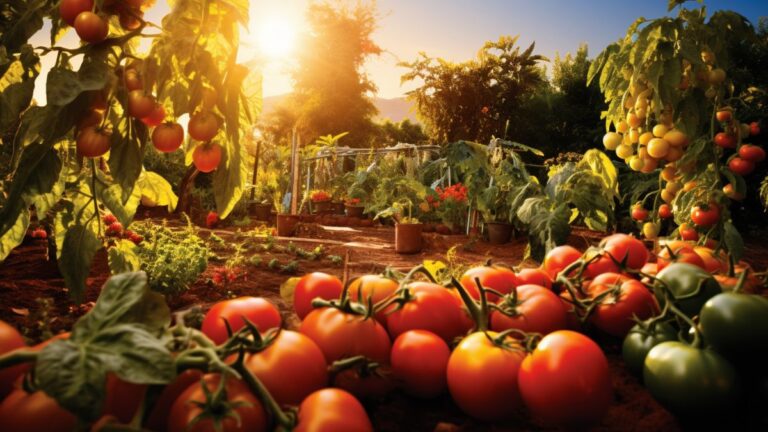14 Tips: Waste Reduction's Positive Effect on Environment
Are you interested in making a positive impact on the environment? Well, we’ve got some great news for you! Waste reduction has a tremendous effect on our planet.
For instance, let’s take the example of recycling. By recycling our waste, we not only help reduce the amount of trash in landfills and incinerators but also conserve natural resources like timber, water, and minerals.
But that’s not all. Waste reduction also saves energy by reducing the need for extracting and processing raw materials. It even plays a significant role in reducing greenhouse gas emissions that contribute to climate change.
Plus, it creates jobs and stimulates economic growth in the recycling and waste management industries. Together, we can protect wildlife, preserve ecosystems, and create a more sustainable society for future generations.
Let’s dive into these 14 tips for waste reduction and make a positive difference!
Reusable Bottles and Cups
We can make a significant impact on reducing waste by using reusable bottles and cups. By replacing single-use plastic containers and cups with reusable alternatives, we can minimize our contribution to plastic waste. Not only does this help the environment, but it can also save us money in the long run.
Reusable bottles and cups are a simple and convenient way to reduce waste without sacrificing our daily routines. By making the switch, we can actively participate in waste reduction efforts and be part of a larger community that values sustainability.
Together, we can create a positive change and contribute to a cleaner and healthier planet. Let’s choose reusable bottles and cups to make a difference in reducing waste and protecting our environment.
Use Reusable Bags
To further minimize waste and contribute to a cleaner environment, let’s embrace the use of reusable bags.
By using reusable bags instead of one-time-use plastic bags, we can significantly reduce waste and its negative impact on the environment. Plastic bags are a major contributor to pollution, taking hundreds of years to decompose in landfills.
By opting for reusable bags, we can help reduce the amount of plastic waste that ends up in our landfills and oceans.
Additionally, reusable bags are sturdier and can hold more items, making them a practical choice for grocery shopping or any other errands.
Let’s make a conscious effort to choose reusable bags and join the movement to reduce waste and protect our planet.
Wise Purchasing and Recycling
When it comes to reducing waste and making a positive impact on the environment, one important aspect to consider is wise purchasing and recycling.
By checking labels for recyclable plastics (1, 2, 4, 5, 7) before making a purchase, we can ensure that we’re supporting products that can be recycled.
Additionally, buying products with less packaging or recyclable packaging helps to reduce waste.
Utilizing reusable containers and bags for beverages and groceries also plays a crucial role in reducing the usage of one-time-use plastic items.
Furthermore, using reusable mugs, silverware, plates, bowls, and cups at work can help us avoid single-use food and drink containers and utensils.
Lastly, purchasing secondhand items and shopping locally not only supports local charities but also reduces packaging waste.
Composting Benefits
Composting improves soil quality, reduces the need for fertilizers, and contributes to environmental conservation. By composting organic waste such as fruit and vegetable scraps, eggshells, coffee grounds, grass clippings, and leaves, we can create nutrient-rich soil that enhances plant growth. This means we can rely less on chemical fertilizers, which can be harmful to the environment.
Additionally, composting at home increases water retention in the soil, reducing the risk of erosion and benefiting the overall ecosystem. Implementing an organics program, whether on an individual or community scale, also has broader environmental benefits. It helps to reduce methane emissions, a potent greenhouse gas, and minimizes toxic runoff into water sources.
Avoid Single-Use Containers
By implementing waste reduction practices, we can make a significant impact on the environment, starting with avoiding single-use containers. Here are some ways we can reduce the amount of waste generated by single-use containers:
- Use reusable bottles for beverages and reusable grocery bags to reduce the usage of single-use containers and plastic bags.
- Opt for reusable mugs, silverware, plates, bowls, and cups instead of single-use food and drink containers and utensils.
- Make a simple change by using reusable cups and mugs instead of plastic bottles, reducing plastic waste.
- Bring your own containers when shopping locally and buying secondhand items to reduce packaging waste.
Secondhand Shopping and Donations
When it comes to reducing landfill waste, secondhand shopping and donations are key.
Not only does buying used items support local charities, but it also saves money.
Reducing Landfill Waste
Our local community’s commitment to waste reduction is evident through our active participation in secondhand shopping and donations. By engaging in these practices, we can significantly reduce the amount of waste that ends up in landfills.
- Secondhand shopping allows us to find pre-loved items that still have plenty of life left in them, reducing the demand for new products and ultimately decreasing the amount of waste generated.
- Donating gently used items instead of throwing them away not only prevents unnecessary waste but also benefits others in need, promoting a sense of belonging and community support.
- Supporting local charities through donations helps divert items from landfills, giving them a chance to be repurposed or resold.
- By embracing secondhand shopping and donations, we actively contribute to the reduction of landfill waste, ensuring a healthier and more sustainable environment for all.
Let’s continue our efforts to reduce waste and make a positive impact on our community and the planet.
Supporting Local Charities
Through our engagement in secondhand shopping and donations, we actively contribute to the support of local charities and their mission of waste reduction.
By donating gently used items to local charities, we not only reduce unnecessary waste but also benefit others in need. These donations help to extend the lifespan of products and prevent them from ending up in landfills.
Additionally, buying secondhand items not only saves money but also supports local charities financially, allowing them to continue their important work in the community.
Furthermore, donating old cell phones, appliances, and clothes to local charities helps the environment by reducing the need for new production, thus minimizing the environmental impact.
Cost-Effective Sustainable Options
One effective way to reduce waste and save money is by embracing cost-effective sustainable options such as secondhand shopping and donations. Not only do these practices help to reduce waste, but they also contribute to significant cost savings on both personal and community levels.
Here are four reasons why secondhand shopping and donations are beneficial for waste reduction and cost savings:
- Buying secondhand items not only saves money but also reduces the demand for new products, lowering overall resource consumption.
- Donating gently used items to local charities and organizations helps to extend the life of these items and prevents unnecessary waste from ending up in landfills.
- Secondhand shopping and donations promote reuse, which can lead to significant cost savings on maintenance and operating costs, contributing to a more resource-efficient and economically sustainable lifestyle.
- Shopping locally and buying in bulk not only supports local businesses but also reduces packaging waste, thereby positively impacting the environment and saving money.
Shop Local and Buy in Bulk
Supporting local farmers and buying in bulk is an effective way to reduce waste and positively impact the environment.
When we shop local, we not only support our local economy but also reduce the transportation-related emissions associated with long-distance shipping. By purchasing from nearby farmers, we can minimize packaging waste and contribute to waste reduction efforts.
Additionally, buying in bulk allows us to reduce the use of single-use packaging and plastic. When we bring our own containers to fill up on groceries, we avoid the unnecessary waste that comes with individually packaged items.
It’s a win-win situation – we support local businesses and reduce waste at the same time.
Reduce Paper Usage
To reduce paper usage, we can start by implementing simple changes in our daily routines. Here are some practical ways to reduce paper waste:
- Digitize documents: Instead of printing everything out, consider using digital copies and storing them electronically. This not only saves paper but also helps in organizing and accessing information more efficiently.
- Opt for paperless billing: Switch to receiving bills and statements electronically. Many companies now offer paperless options, which not only reduce paper usage but also help in decluttering your physical space.
- Use electronic communication: Instead of sending letters or memos on paper, utilize email or other digital platforms for communication. This not only saves paper but also reduces transportation and mailing costs.
- Support recycling programs: Make sure to properly recycle any paper products you do use. Many communities have recycling programs in place that can help divert paper waste from landfills and promote a circular economy.
Unplug Devices and Appliances
Reducing power usage by unplugging devices and appliances has a significant positive impact on the environment. By making it a habit to unplug these items when not in use, we can contribute to waste reduction and environmental conservation.
Not only does unplugging devices save energy, but it also helps decrease greenhouse gas emissions and conserve natural resources. The reduction in power usage from unplugging appliances directly translates to less waste disposal and a smaller carbon footprint.
Incorporating this simple practice into our daily lives allows us to actively participate in the overall effort of waste reduction and environmental preservation. Together, we can make a difference and create a more sustainable future for our planet.
Energy-Efficient Lighting
Let’s explore the benefits of using energy-efficient lighting for waste reduction and environmental conservation.
Energy-efficient lighting, such as LED bulbs, plays a crucial role in reducing our overall energy consumption and positively impacting the environment. Here are some reasons why energy-efficient lighting is a great choice:
- LED bulbs use up to 80% less energy compared to standard light bulbs, resulting in significant energy savings.
- LED bulbs are highly efficient, utilizing 95% of energy for producing light.
- By switching to energy-efficient lighting, we can reduce greenhouse gas emissions and help combat climate change.
- Energy-efficient lighting also helps in preserving natural resources, as it requires less energy generation.
By adopting energy-efficient lighting practices, we can make a substantial contribution to waste reduction and environmental conservation.
Let’s embrace this simple change for a greener future.
Recycle Whenever Possible
We should prioritize recycling whenever possible to maximize waste reduction and have a positive impact on the environment.
Recycling is a simple and effective way to reduce the amount of waste that ends up in landfills, conserving resources and minimizing pollution. By recycling items such as glass, plastic, and aluminum, we can help decrease the demand for raw materials and energy-intensive manufacturing processes.
Look for products labeled with recycling codes 1, 2, 4, 5, or 7 when making purchasing decisions. Additionally, using reusable cups, mugs, and bags can significantly reduce plastic waste.
Remember, every effort counts when it comes to waste reduction. By recycling whenever possible, we can contribute to a cleaner and healthier environment for ourselves and future generations.
Let’s join together in making a positive impact through recycling.
Conserve Water
To further promote waste reduction and its positive impact on the environment, it’s essential to prioritize the conservation of water. Conserving water not only helps us save this precious resource, but also plays a vital role in protecting our environment.
Here are a few simple ways we can conserve water and contribute to waste reduction:
- Take shorter showers and choose showers over baths.
- Wait to do laundry until it’s full to avoid half-loads and save water.
- Turn off the faucet while brushing teeth to reduce water wastage.
- Use a watering can instead of a hose for lawn or garden to minimize water usage.
By incorporating these habits into our daily lives, we can make a significant difference in both water conservation and waste reduction.
Together, let’s take small but meaningful steps to create a more sustainable future for ourselves and our planet.
Plant Trees for the Environment
Let’s talk about the benefits of planting trees and the positive impact they’ve on the environment.
When we plant trees, they help to absorb carbon dioxide and release oxygen, improving air quality.
Additionally, trees provide shade which reduces the need for energy-consuming cooling systems, saving both energy and money.
Tree Planting Benefits
Planting trees offers numerous benefits to the environment. These benefits include improved air quality, energy conservation, and increased property value.
- Trees absorb carbon dioxide and release oxygen, helping to create a healthier environment.
- They provide shade, reducing the need for cooling systems and conserving energy.
- Large trees can produce enough oxygen for four people in a day, highlighting their impact on air quality.
- Additionally, planting trees can add value to your home.
By planting trees, we can actively contribute to waste management and recycling efforts. Trees absorb harmful pollutants from the air, acting as natural filters. They also help to mitigate climate change by absorbing carbon dioxide, a greenhouse gas.
Furthermore, trees can provide habitat for wildlife, support biodiversity, and improve overall ecosystem health.
Environmental Impact of Trees
By actively contributing to waste management and recycling efforts, we can harness the environmental impact of trees to create a positive effect on our surroundings.
Trees play a crucial role in waste reduction as they absorb carbon dioxide, a major contributor to climate change, and release oxygen, improving air quality. In fact, a single large tree can produce enough oxygen for four people in a day.
Additionally, trees provide shade, reducing the need for energy-intensive cooling systems and contributing to energy conservation. By planting trees, we not only benefit the environment but also add value to our homes.
Furthermore, trees help mitigate the negative impact of landfills on climate change by absorbing harmful greenhouse gases. Therefore, planting trees is a simple yet effective way to combat waste and contribute to a healthier, more sustainable planet.
Donate Gently Used Items
One way to reduce waste and have a positive impact on the environment is by donating gently used items. By donating these items instead of throwing them away, we can help reduce unnecessary waste and support local charities and organizations.
Here are four reasons why donating gently used items is beneficial for waste reduction:
- Benefit others: Donating gently used items allows others to benefit from items that are still in good condition. It gives these items a second life and helps someone in need.
- Reduce landfill waste: Instead of adding to the growing amount of waste in landfills, donating gently used items helps keep them out of the trash. This reduces the strain on our environment and promotes sustainability.
- Support local charities: When we donate gently used items, we’re supporting local charities and organizations. These donations can help them raise funds, provide resources, and make a positive impact in our communities.
- Contribute to a more sustainable lifestyle: By choosing to donate gently used items, we’re actively participating in waste reduction efforts. This contributes to a more sustainable lifestyle and promotes a sense of belonging to a community that values the environment.
Conclusion
In conclusion, by implementing these waste reduction tips, we can make a significant positive impact on the environment.
Just like the ripple effect caused by a single pebble in a pond, our small actions can create a chain reaction of change.
Let’s be mindful of our consumption, opt for reusable alternatives, and recycle whenever possible.
By doing so, we can contribute to a more sustainable future for our planet and generations to come.
Together, we’ve the power to make a difference.






